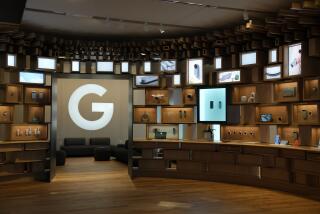Judge Acquits Immigrant of Trying to Export High-Tech Device to China
- Share via
Accusing the government of illegal entrapment, a federal judge acquitted a Southern California businessman Thursday of trying to supply China with a sophisticated infrared camera used in missile guidance systems.
U.S. District Judge Florence-Marie Cooper found that an undercover FBI agent coerced Jeffrey Jhyfang Lo, 52, into smuggling the 10-pound camera out of the country in a suitcase.
Lo, a Taiwanese immigrant who operates a high-tech export business from his home in Cypress, was arrested with the camera in February as he boarded a China-bound flight at Los Angeles International Airport.
He was indicted on charges of illegally exporting dual-use technology and money laundering, crimes punishable by 10 years in prison.
Assistant U.S. Atty. David Vaughn, who defended the agent’s conduct in a final argument before the judge, was stunned by the verdict. He left the courthouse without talking to reporters and did not return phone calls seeking comment.
Defense lawyer Richard Steingard suggested in his closing argument that Lo might have been targeted because he is Chinese. The judge said there was no evidence to support that charge.
Cooper did find, however, that undercover FBI Agent John Zelinski, posing as a salesman for Raytheon, the camera’s manufacturer, pressured Lo into taking the camera and two lenses to China, concealed in a suitcase, without an export license.
The judge cited what she said was a litany of suggestive comments by Zelinski that included advice to Lo about how to conceal the camera and assurances that he would never be caught.
Zelinski’s conversations with Lo were secretly recorded during the seven-month investigation. They became the focal point of the trial.
Cooper said Zelinski’s pressure on Lo to violate the export law “increased with intensity and specificity” after Lo announced he was no longer interested in buying the $142,000 camera and taking it to China.
Zelinski testified he tried to steer Lo away from committing any crime because he was operating in a counterintelligence role, hoping to use Lo to learn about Chinese military weaknesses. But Cooper said
his testimony was “not credible.”
According to trial testimony, Lo wanted to take the camera out of the country to demonstrate its capabilities for the Chinese State Shipbuilding Corp., an arm of the State Commission of Science, Technology and Industry for National Defense.
Lo was competing with French and Israeli suppliers in a deal to sell China a total of 38 infrared cameras for its coast guard fleet.
The Raytheon camera can be purchased without restriction on the domestic market, but its export requires approval from the Commerce Department.
More to Read
Sign up for Essential California
The most important California stories and recommendations in your inbox every morning.
You may occasionally receive promotional content from the Los Angeles Times.










